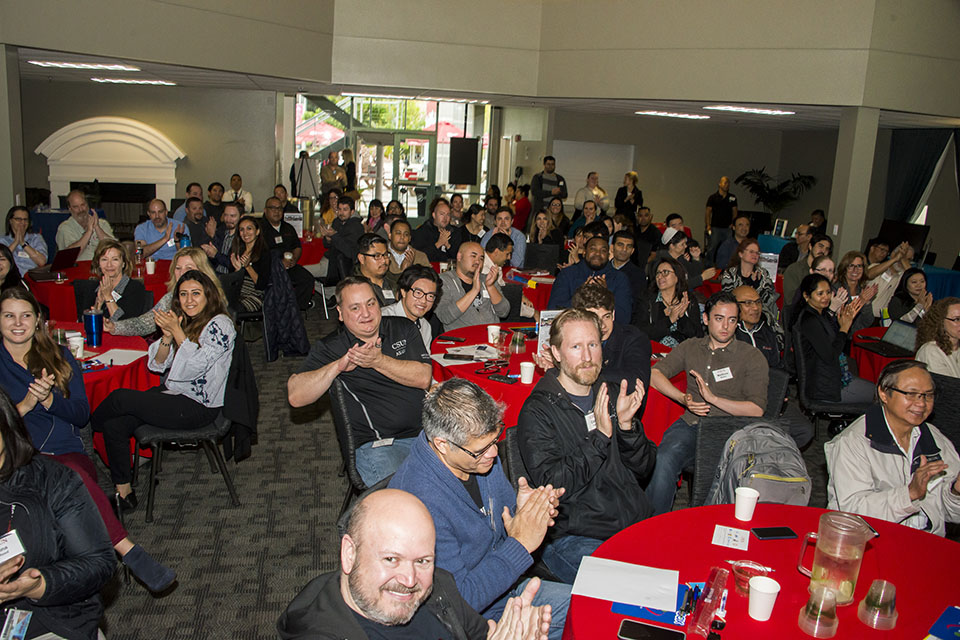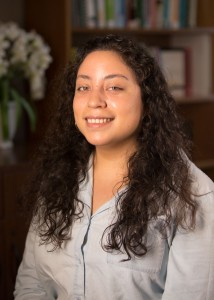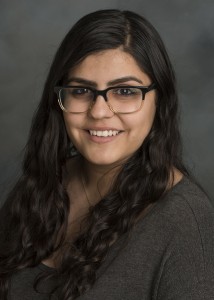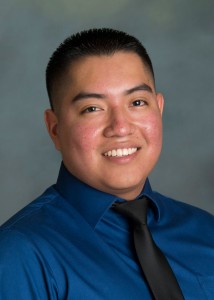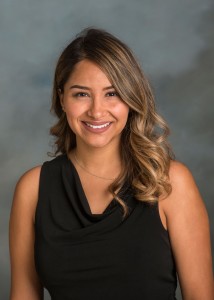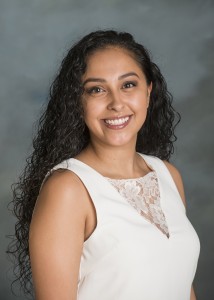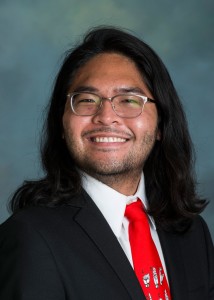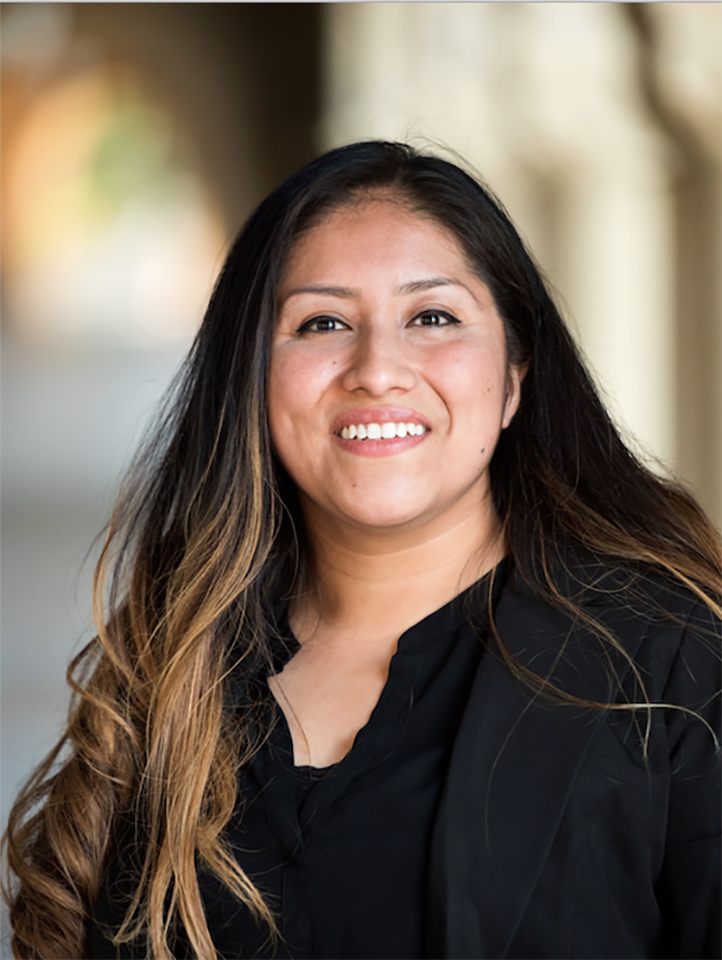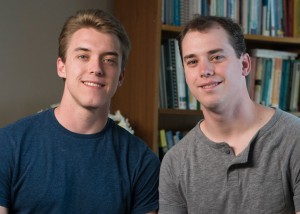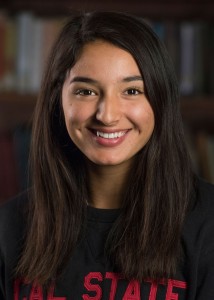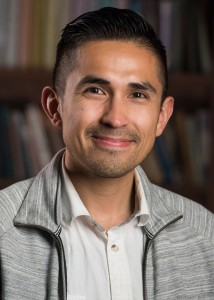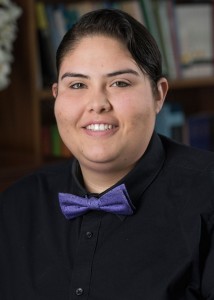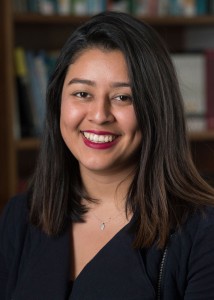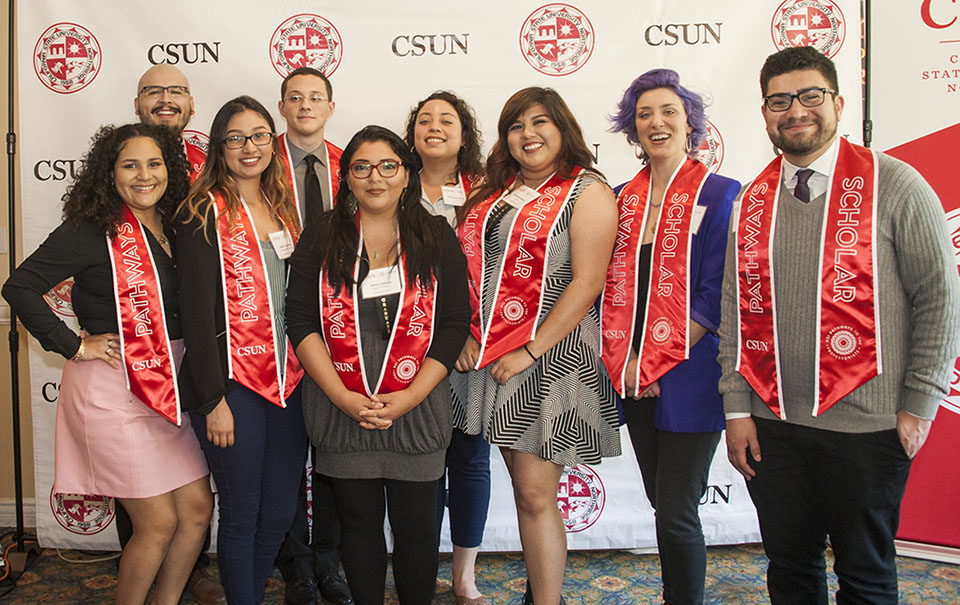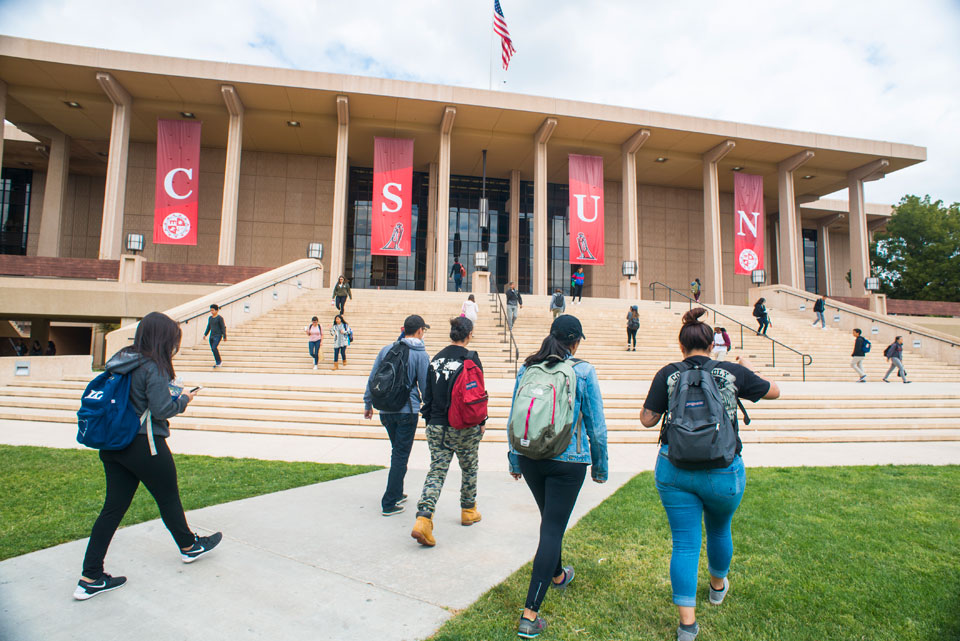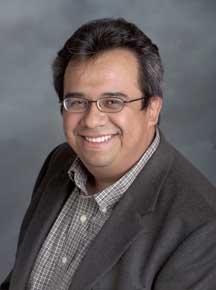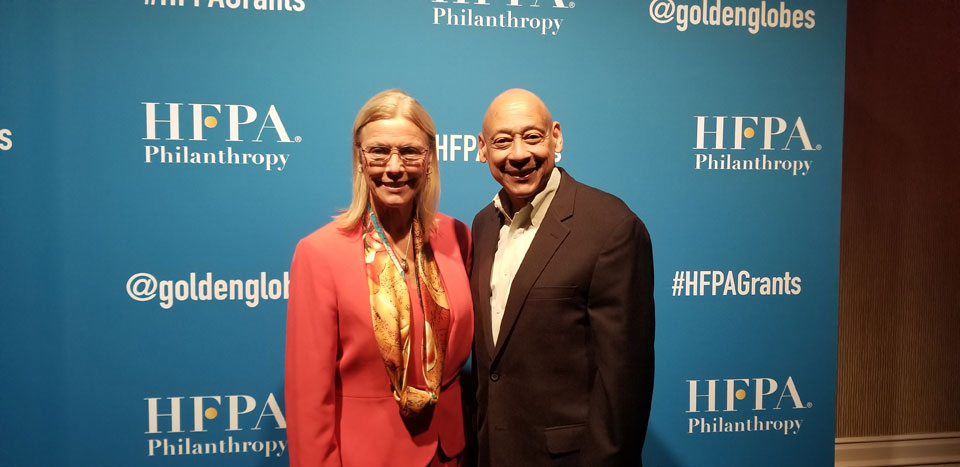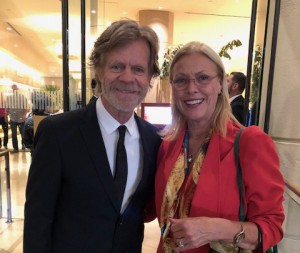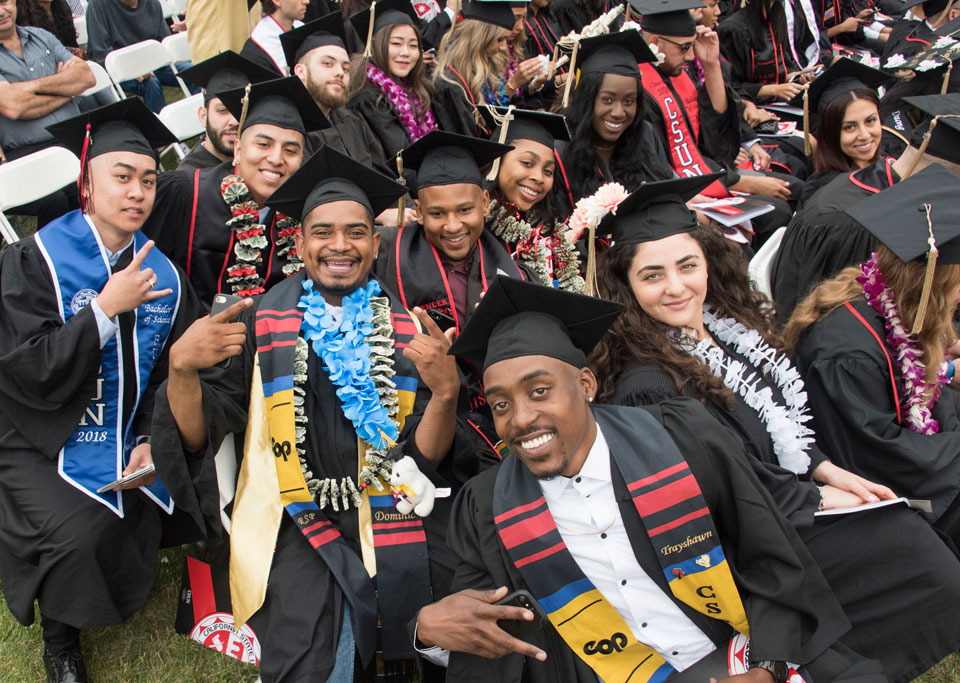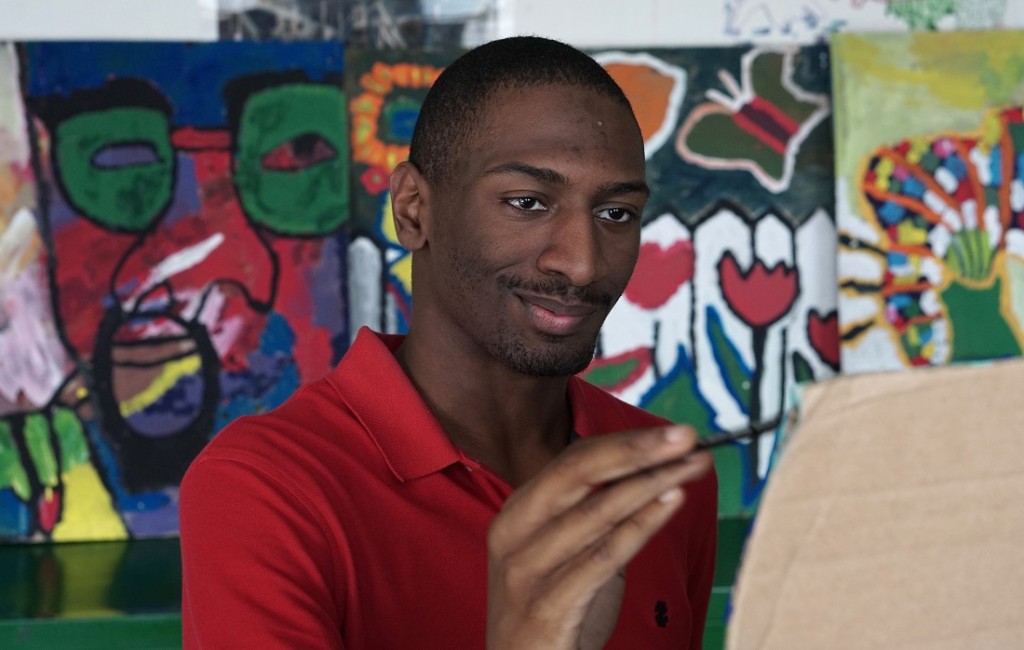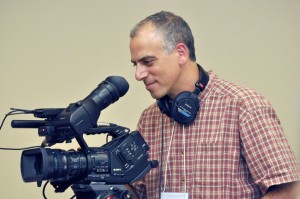![]()
Many are the first in their families to get a college education. Others have used their experiences in the foster-care system as inspiration to aim for the highest bar. Still others came to California State University, Northridge determined to get the tools they need to make a positive impact on the world.
The cheers may be deafening this week when more than 11,500 students are expected to take part in CSUN’s 2018 commencement ceremonies. Each student has a personal story of hard work, perseverance and success. Below are just some of these unique stories:
![Justin, left, and Jordan Brooks]()
Justin, left, and Jordan Brooks
Justin Brooks, B.A. in Criminology and Justice Studies, and Jordan Brooks, B.A.s in History and Religious Studies
When Justin Brooks came to CSUN as a freshman four years ago, he flirted with the idea of being an English major. His twin brother, Jordan, who started CSUN the same year, was thinking about becoming a special education teacher.
As they explored the university and all it had to offer, they discovered how to turn their passions — for Jordan, history, and for Justin, trying to make the world a safer place — into careers.
“If I got an offer from Harvard right now, I’d turn it down,” said 22-year-old Justin. “There’s no other place I’d rather be than CSUN. The faculty here, they changed my life.”
Jordan, who has autism, agreed. He said support from the university’s faculty and staff stoked a fire in him to succeed — leading to a near-perfect GPA during his four years at CSUN, despite a double major and a part-time job — and a desire to teach history someday, perhaps at the college level.
He is taking a year off after graduation to study for the graduate admissions exam, and then has his eyes on the University of California, Santa Barbara doctoral program in history. He is particularly interested in the period between World War I and World War II and “how human beings manifest ideology for their own ends,” Jordan said.
Growing up in a relatively rough neighborhood in Van Nuys, Justin was frustrated by friends’ and neighbors’ fear for their safety and the lack of resources for crime victims or those struggling with homelessness.
“I felt helpless and decided to explore criminology to try to understand why things happened the way they did,” he said.
Justin, who also has maintained a near-perfect GPA while at CSUN, despite holding down two jobs for a while, is part of the first cohort to graduate from the university’s year-old Department of Criminology and Justice Studies. He has begun preparing for the rigorous tests he must pass before he’s considered as a candidate for the Los Angeles Police Department (LAPD).
“People have a stereotype of what a police officer does,” he said. “It’s not just about rescuing people. There’s also a lot of outreach. I’d like to be part of something like Operation Progress (a program that pairs students in Watts with LAPD mentors and encourages them to pursue higher education). I want to be part of something that makes a positive impact in the community.”
That sense of inclusion and respect for the rich diversity that makes up the community was a factor in the brothers’ decision to attend CSUN.
“We grew up in an incredibly diverse neighborhood, and continuing to learn in a diverse, accepting community was important to us,” Justin said.
“I can’t imagine any other place than CSUN where that would happen,” Jordan added.
Both young men will take part in the College of Social and Behavioral Sciences commencement ceremony at 8 a.m. on Sunday, May 20, where Justin will receive his bachelor’s degree in criminology and justice studies and Jordan will receive his bachelor’s degree in history. Jordan also is eligible to take part in the College of Humanities commencement ceremony at 8 a.m. on May 21, where he will receive his bachelor’s degree in religious studies.
![Gardenia Centanaro]()
Gardenia Centanaro
Gardenia Centanaro, B.S. in Political Science
Gardenia Centanaro, 23, of Northridge, is just 6 inches, a little less than the span of a hand, away from clearing one of her goals. She will be spending the next two years in pursuit of those 6 inches. If all goes right, she’ll be representing Mexico in women’s pole vault at the 2020 Olympics in Tokyo.
Her path to the Olympics will not be easy, with Centanaro dividing her time between the Chula Vista Olympic Training Center, coaching pole vault at Pitzer College in Claremont and working on her master’s in nonprofit-sector management through an online program at CSUN.
“It’s going to be a couple of busy years, but I’m up to it,” she said.
Centanaro, a first-generation college student, grew up in foster care. Her mother, an addict, was unable to care for her nine children. She died when Centanaro was 8 years old, and Centanaro and her siblings permanently became part of the foster care system.
Determined that she not become “another statistic,” her foster father, who was once a pole vaulter, volunteered to coach pole vault at Centanaro’s Corona high school so she could experience the joys and learn the work ethic associated with the sport.
“Pole vaulting is a demanding sport that demands a positive attitude,” she said. “It’s a sport where you have to clear a bar, and they keep raising it until you can’t make it any more. You always end on a miss, thinking about how you can get it next time. And that’s life, you’re always going to have a limit and you are going to have to figure out how to get past it.”
She attracted the attention of CSUN Athletics, which invited her for a visit in 2014.
“It had a totally different atmosphere than any other school I had visited,” Centanaro said. “It was so diverse and so warm. I felt I belonged here.”
Centanaro made the most of her time at CSUN. In 2016, she won the Big West Conference pole vault title with a school-record performance of 4.06 meters, or 13 feet 3.75 inches. In 2017, she placed second at the Big West Championships in the pole vault with a clearance of 3.92 meters, or 12 feet 10.25 inches, and had a career-best clearance of 4.12 meters, or 13 feet 6.25 inches, which earned her second place at the Mountain Pacific Sports Federation Championships.
Despite the demands of training and competing, Centanaro held down at least two jobs while maintaining a high GPA, a fete that earned her regular membership in Varsity N, a group of high academic-achieving student-athletes. She even served as the lead student on a research project with political science professor Kristy Michaud that examined water conservation among Los Angeles renters.
Centanaro said her fondest CSUN memories include the time she spent with her fellow student-athletes, not on the fields, but studying together. “We spend so much time together that they have become family,” she said.
“Most people have this misconception that student-athletes don’t work hard when it comes to academics when, really, we have this work ethic instilled in us from athletics that makes us want to excel in academics,” she added. “The whole definition of work is to physically and mentally push yourself to accomplish a result, and that’s what athletes do. When it comes to the classroom, we still have that idea of work.”
Centanaro was born in the United States, but her biological parents were from Mexico, thus giving her dual citizenship and an opportunity to compete at the 2020 Olympics representing Mexico — a goal she intends to work toward for the next two years. Once the Olympics are over, Centanaro plans to turn her focus to her ultimate goal — establishing a nonprofit that encourages foster children to get an education and to take advantage of educational opportunities.
She is expected to take part in the College of Social and Behavioral Sciences commencement ceremony at 8 a.m. on Sunday, May 20.
![Fedrick De La Paz]()
Fedrick De La Paz
Fedrick De La Paz, B.A. in Religious Studies
Fedrick De La Paz, 31, of Los Angeles, credits his wife, Dulce, with inspiring him to get his degree. For years, he would take one or two classes at local community colleges, while Dulce completed her bachelor’s degree at University of Nevada, Las Vegas before getting a master’s degree in architecture a little more than two years ago.
“That’s when I got the kick in the butt, and I thought I really needed to get on,” said De La Paz, who worked as a bartender while his wife concentrated on her studies. “I was in that work mode, working full time and being that figure, that head of household, while she was in school. Now the roles have changed. She has been amazing, supporting me all the way while I am in school.”
De La Paz took community college classes in a variety of subjects, including business, philosophy, architecture and interior design. It wasn’t until he took a class in world religions that he found his passion.
“Religious studies gives you a foundation of exposure to different perspectives,” he said. “When you think of researchers or scientists, they are very observant but disconnected from the people or things they are researching. With religious studies, you can research, but there is a certain amount of compassion that is instilled in you so that you are connected with the people you are researching.”
In the two years since he transferred to CSUN from East Los Angeles College, De La Paz has added minors in American Indian studies and civic and community engagement to his class load. He served as vice president of the American Indian Student Association, was a member of the College of Humanities Dean’s Student Council and worked at the campus’ Sustainability Garden, where he harvested produce for the CSUN Food Pantry. He also collaborated with the Departments of American Indian Studies, Central American Studies and Chicana and Chicano Studies to organize the Indigenous Community Garden Initiative, a space for students to apply sustainable practices in growing food.
De La Paz is the first in his family, besides his wife, to get a college degree. He has applied to graduate school, and he plans to study religion, spirituality and culture, and how dominant culture changes and/or affects them.
“Achieving a doctoral degree will allow me have that foundation of academia that no one can ever take away from me,” he said. “I can also serve as an example for others — that they can achieve their aspirations even if they have a different skin tone, ethnicity, religion, background or whatever it may be.”
More importantly, he wants to be a role model for what is possible. He tells the story of a friend who almost missed applying for graduate school because he was $15 shy of the application fee. When De La Paz heard the story, he reached into his pocket and pulled out $15, all the money he had that day, and told his friend to apply.
“He couldn’t pay me back for two months, but I didn’t care,” De La Paz said. “That $15 made all the difference. He got accepted and now he’s going to get a master’s degree. He is the first in his family to do anything in higher education. Fifteen dollars shouldn’t stop you from pursuing your dream.”
In 15 years, De La Paz said, he may consider running for mayor of Los Angeles.
“That’s one of my goals — to seek some sort of understanding of politics and bureaucracy and help people,” he said. “I want to be able to demonstrate that people should be more open to differences, and realize that those differences make us all the same because we are all different.”
He will take part in the College of Humanities commencement ceremony at 8 a.m. on May 21.
![Stacey Leal]()
Stacey Leal
Stacey Leal, B.A. in Communication Studies
Stacey Leal, 30, of Santa Clarita, was fully immersed in campus life in the fall of 2017. She had transferred to CSUN from the College of the Canyons only a year before and loved her classes, as well as her job at the university’s Pride Center, helping coordinate events and facilitating the center’s Queer and Trans People of Color Conversations. Then, Hurricane Maria slammed into Puerto Rico.
Leal — who was born in Miami, Fla., but spent much of her childhood in Puerto Rico — was worried about her father, who lives on the island.
“The hardest thing was the complete radio silence for four days,” she said. “I did not know if something had happened or if he was fine.”
It was a relief when he finally called, though the connection was spotty given the power outage that blanketed the U.S. territory. He was unharmed and his home was spared the worst of the damage, thanks to its higher elevation. Leal said the support she received from her colleagues at the Pride Center helped her get through the hard time.
It was that sense of community, Leal said, that drew her to CSUN.
“I was surprised by how many communities there were here,” she said about a CSUN campus she made while at community college. “What really stuck out to me was the LGBTQ community on campus and the Latinx community on campus. I felt that this was somewhere where I could be comfortable with my identity.”
Her parents divorced when Leal was in high school, and she moved to Santa Clarita with her mom. She attended community college a couple times — with a three-year break in New Mexico — before completing an associate degree in communication studies from College of the Canyons and transferring to CSUN.
“I have never felt more comfortable on a campus than I have at CSUN,” Leal said.
She recalled the adjustments she had to make moving from the heavily Latino neighborhoods of her childhood in Miami and Puerto Rico to largely white Santa Clarita. Though the area has a sizable Latino community, it is mostly Mexican-American, and Leal, whose mother is Nicaraguan, spoke Nicaraguan and Puerto Rican Spanish.
She laughed recalling her attempts to order a “torta” in a Mexican restaurant. In Mexican Spanish, a “torta” is a type of sandwich. In Nicaraguan, a “torta” is a cake, while in Puerto Rican Spanish it is often a fried pastry.
Her ability to adjust and help others become comfortable in their own skin drew the attention of Los Angeles City Councilwoman Nury Martinez, who honored Leal for her work advocating for the LGBTQ community.
Leal said her time at CSUN has given her insight into what she would like to do with her life. She has applied the university’s master’s program in communication studies, and whether she eventually owns her own business or works for somebody else, she said she is determined to find ways to give back to the community.
Leal will take part in the commencement ceremony for the Mike Curb College of Arts, Media, and Communication at 6 p.m. on Friday, May 18.
![Paulina Silva]()
Paulina Silva
Paulina Silva, B.S. in Business Law
Paulina Silva, 22, a first-generation college student, has known since she was about 8 years old that she was interested in being a lawyer. Now, 14 years later and about to graduate from CSUN, she has applied to law school and hopes to someday have a corner office at a corporate law firm.
The path to that corner office has been filled with obstacles. Those experiences, she said, have only made her stronger and more determined to succeed.
“When a door closes, which has happened so many times for me, you see the other door and you realize you can get through,” Silva said. “I’ve learned how to be a problem solver and have developed new skills. I now see what I have been through as an asset.”
Silva said the minute she walked onto CSUN’s campus as a freshman four years ago, she knew it was where she belonged. “With the rich diversity on campus, instead of feeling isolated, I found a place where there were people like me,” she said.
Faculty and administrators such as Robert Sheridan, Hilary Goldberg, Melanie Williams, then-Interim Dean Deborah Cours, Kenneth Premo and many more “did everything they could to help me,” she said.
Silva threw herself into her classes and became active in a number of student organizations in the David Nazarian College of Business and Economics. She is the business college’s academic student senator; president of the pre-law student association; president of the student leadership council, Leaders in Alliance for the business college; and worked alongside Interim Dean Cours to promote student engagement and the university’s student success initiative, Matadors Rising.
As the political climate came more volatile for undocumented immigrants, including people with DACA status, Silva decided to advocate for students.
Silva said her final year at CSUN has been “crazy.” She had to juggle classwork demands, her student leadership obligations and studying for the law school entrance exam.
During the worst of it, she said, her mentor, business law professor Hilary Goldberg, took her aside to give her some advice.
“She said to look at it as if I were training for a marathon — make sure your body is rested and well fed,” Silva said. “She also gave me her lucky pencils, which commingled with the pencils she took the bar exam with.”
While she waits to hear the results of her law school applications, Silva envisions a career in corporate law in which she can also positively affect public policy. She is considering entering politics someday, or perhaps working on international business relations for the United Nations.
Silva will take part in the commencement ceremony for the David Nazarian College of Business and Economics at 8 a.m. on Saturday, May 19.
